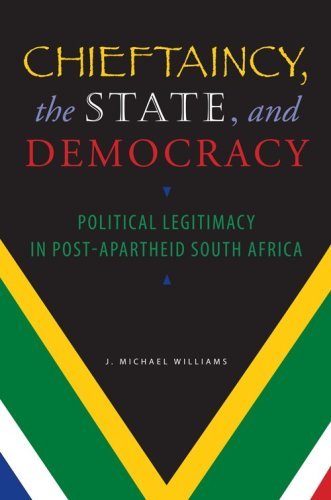 Click Here for: Outline for Book Critique
Click Here for: Outline for Book Critique
In J. Michael Williams’ Chieftaincy, the State, and Democracy: Political Legitimacy in Post-Apartheid South Africa, the relationship between the new South Africa’s sources of mixed authority is examined through field research conducted in rural areas in KwaZulu-Natal around the turn of the Millennium. Williams tells of an ongoing struggle in South Africa about political legitimacy between the state and chieftaincy regarding which institution has the right to exert authority in rural areas.
Williams focuses on how the chieftaincy seeks to establish and maintain its political legitimacy with the local population as well as the state in the post-apartheid era. Through comparative case studies he analyzes specifically on how chieftaincy and local populations have negotiated the introduction of specific norms, rules, processes, and institutions that are fundamental to the ANC’s policies of transformation and democratization.Through a framework that Williams calls the multiple legitimacy framework, he seeks to show how the chieftaincy has sought to establish and maintain its authority in the midst of these political changes. With chieftaincy still a central figure in the lives of rural communities in South Africa, the examination of the complexity of the chieftaincy-state and chieftaincy-society relationship that have formed and continue to evolve in the post-apartheid world.
Williams says his analysis is necessary because current assumptions about legitimacy conclude that power will eventually reside in the government as democracy and local government become more ingrained in society. He uses his framework in understanding the results from three case studies in the South African province of KwaZulu-Natal and supplements the data with national economic and survey data from other authors in the field. While stopping short of drawing empirical generalizations, he seeks to use his analysis to tell the story of real South Africans who deal with the struggles of the post-apartheid political structure in their daily lives.
